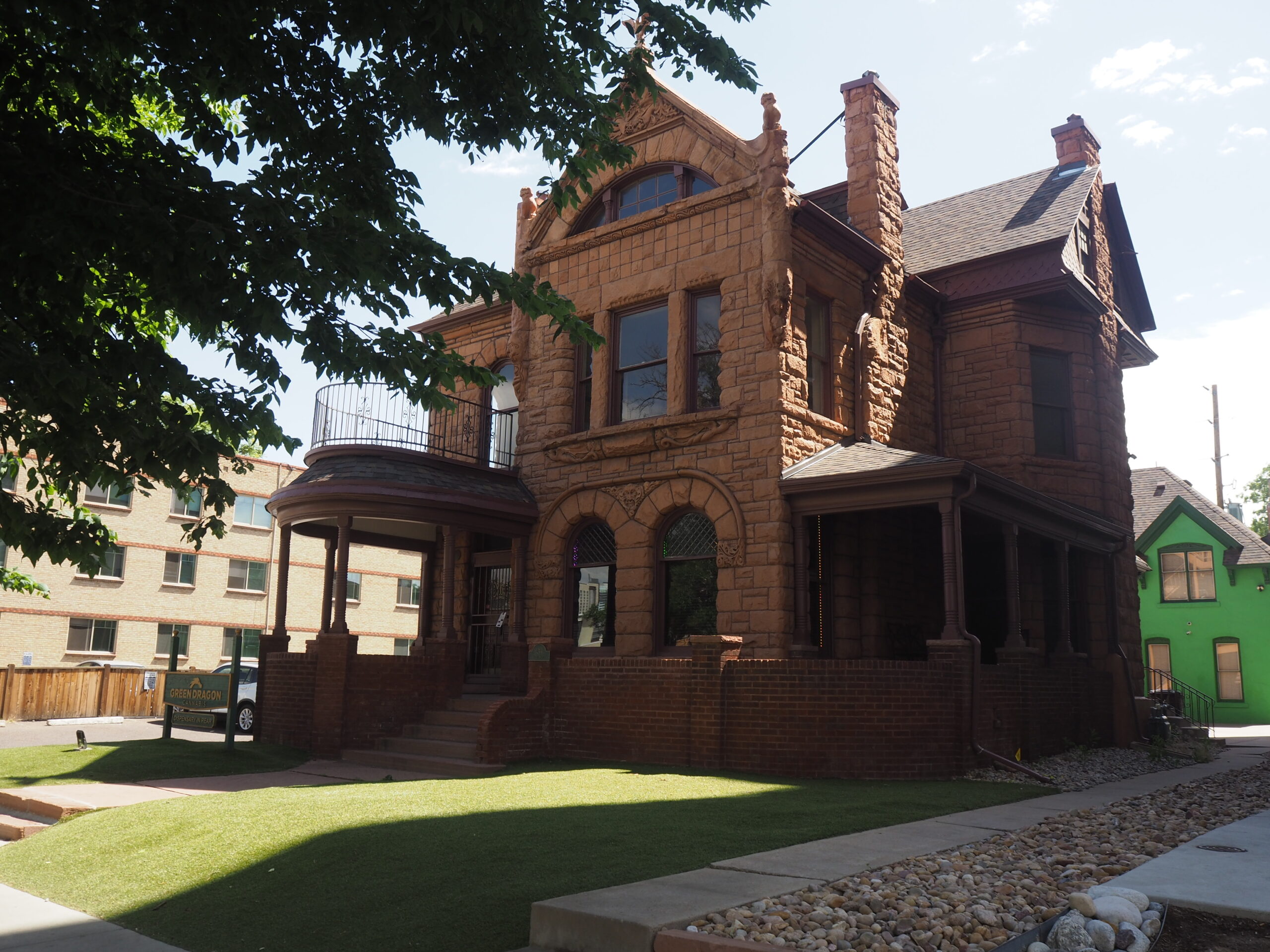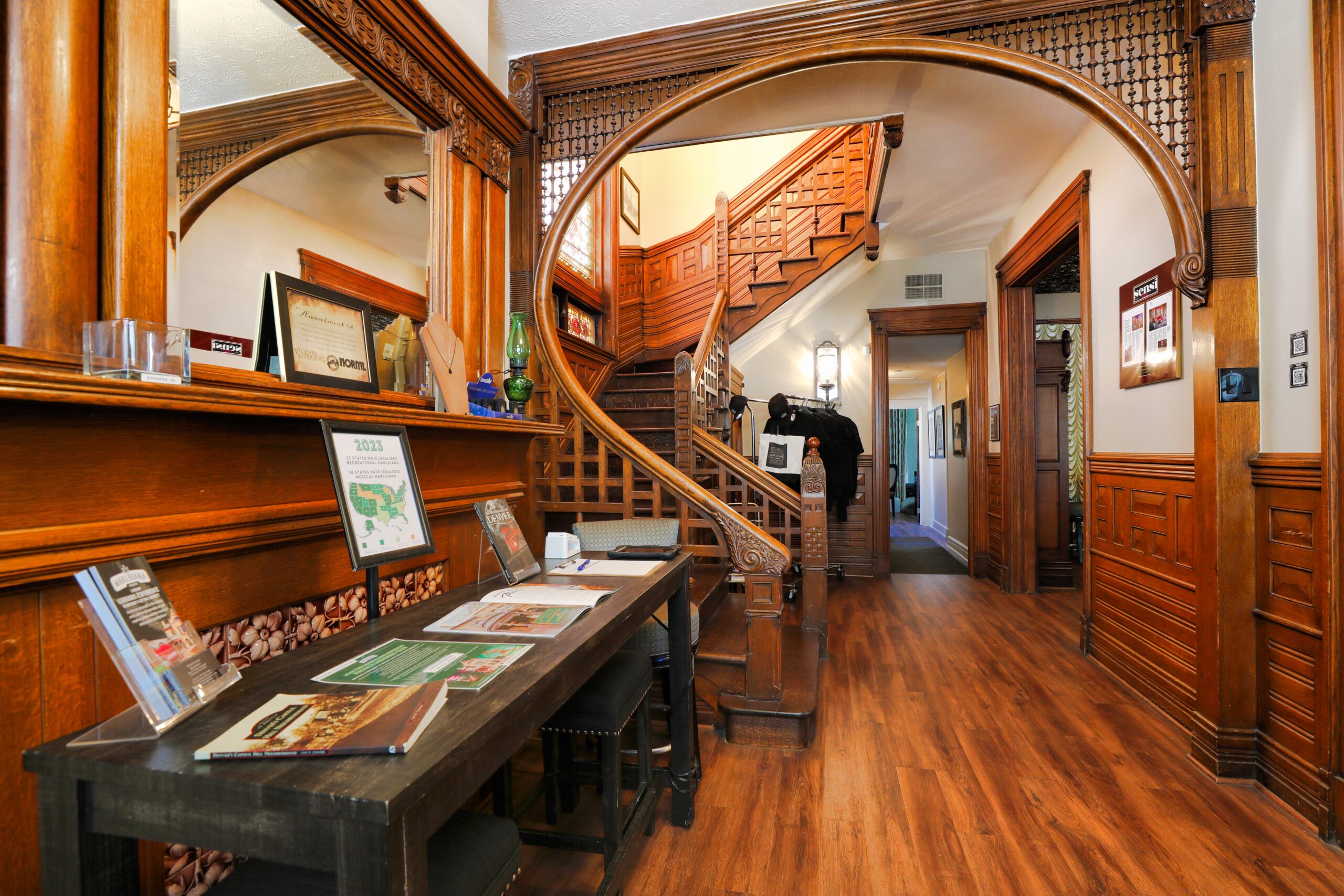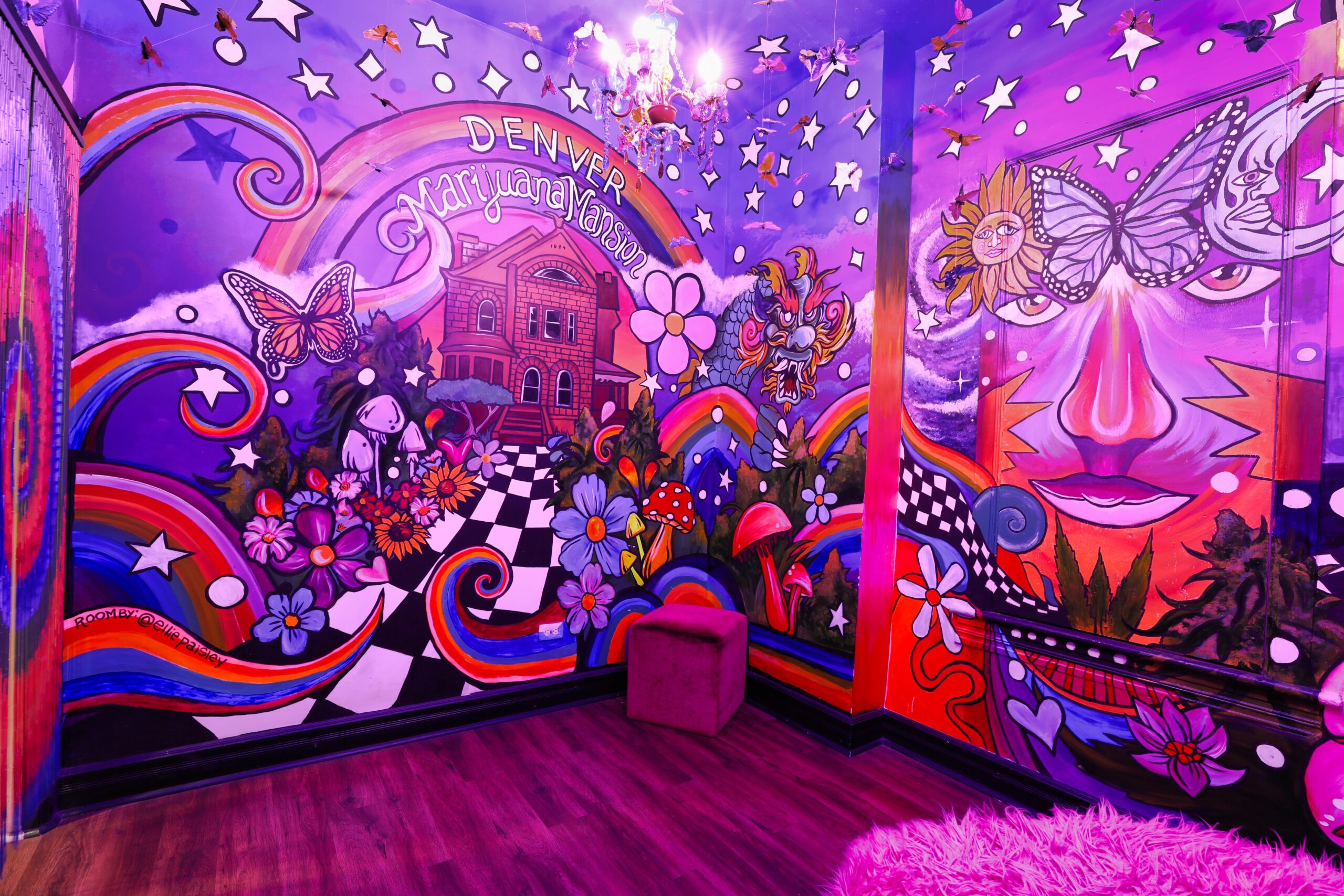
The Creswell Mansion, more recently known as “Marijuana Mansion,” has sold following the closure of the cannabis-centric event space within it. (Karoline Leonard/BusinessDen)
Denver’s “Marijuana Mansion” is back to just being the Creswell Mansion.
The protected city landmark at 1244 N. Grant St. last week sold for a little over $1 million to local radiologist and developer John Hotchkiss IV, who does not plan to keep the building as an event space for the cannabis-minded community.
“It just sort of spoke to me,” Hotchkiss said. “I certainly wasn’t going in there looking to actually pursue purchasing it when I first saw it, but walking inside, it’s just overwhelming. Things are not made this way anymore.”
The property sits on 0.15 acres, and the mansion is 5,716 square feet, meaning it sold for about $175 per square foot. The building, a protected city landmark, is zoned for commercial office.
Hotchkiss said the property will house several of his LLCs, but he hasn’t determined his plans for the property beyond that.
“I have a few ideas that I’m thinking about, but I haven’t even begun working on finalizing anything,” Hotchkiss said. “The space has a lot of interesting and artistic flourishes from the previous owners, so I’m meandering my way through figuring out what to do and how to do it.”

The interior of the building. (Courtesy Lisa Leder)
The deal did not include the carriage house behind the mansion, which houses a Green Dragon dispensary, Hotchkiss said. That building is also for sale, but Hotchkiss noted Colorado’s marijuana industry is in a tough moment, with sales down significantly since peaking in 2020.
“I’m certain that not all dispensaries are distressed, but many of them are and the industry as a whole is going through some consolidation and contraction, in Denver especially. … All real estate is good at the right price, I suppose, but it’s a much more difficult transaction,” Hotchkiss said. “There’s a lot of complexities and nuances due to it being licensed as a dispensary.”
Lisa Leder, who owned the mansion and still owns the Green Dragon property, told BusinessDen she decided to sell the mansion because the complexity of Denver’s marijuana hospitality laws, which allow for public weed consumption, made it too expensive to operate.
Leder, who now lives in Florida, purchased both properties for $2.1 million in 2019 and spent about $250,000 renovating the mansion into a dedicated event space for art and cannabis history.
“The mansion was never used as a social consumption lounge nor did we ever try to apply for a social or hospitality consumption license,” Leder said. “However, Denver’s rules became highly restrictive so that they would not even allow cannabis consumption even at private events. … Government overregulation can really hurt businesses. We put a lot of money into creating this amazing space and ultimately we were unable to operate it profitably.”
Denver allows for mobile consumption buses, Leder said, so her business decided to offer a bus to pick up groups from the mansion to take them off site to consume. But Leder said it got too expensive for people to hold events and too inconvenient for guests due to the regulations.
Upon deciding to sell, Leder originally asked $2.3 million for both the mansion and carriage house.

A room within the Marijuana Mansion. (Courtesy Lisa Leder)
The 1244 N. Grant building was originally constructed in 1889 for Joseph Creswell. It was named a city landmark, a status that effectively prevents demolition, in 1975.
The building became linked to marijuana when Vicente Sederberg, a cannabis-focused law firm that played a major role in statewide recreational legalization, moved its offices there in 2013. After Vicente Sederberg outgrew the space, a cannabis lobbyist attempted to turn the mansion into a pot-friendly spa in 2018 until the city rejected the proposals.
Hotchkiss is originally from Colorado but has done development work across the country, including in Omaha and Tacoma, Washington. Hotchkiss said this type of property is a first for him, as his previous properties in Colorado have been apartment buildings or vacant lots.
Hotchkiss said the mansion will require renovations, but the feeling of going back in time that the mansion offers was hard to pass up.
“We don’t have things that are very old and historic out here the same way they do on the East Coast,” Hotchkiss said. “It’s a really interesting feeling that I get. … You can walk around and feel that there has been a lot of life that has been lived in that building, and it’s really humbling in a way.”

The Creswell Mansion, more recently known as “Marijuana Mansion,” has sold following the closure of the cannabis-centric event space within it. (Karoline Leonard/BusinessDen)
Denver’s “Marijuana Mansion” is back to just being the Creswell Mansion.
The protected city landmark at 1244 N. Grant St. last week sold for a little over $1 million to local radiologist and developer John Hotchkiss IV, who does not plan to keep the building as an event space for the cannabis-minded community.
“It just sort of spoke to me,” Hotchkiss said. “I certainly wasn’t going in there looking to actually pursue purchasing it when I first saw it, but walking inside, it’s just overwhelming. Things are not made this way anymore.”
The property sits on 0.15 acres, and the mansion is 5,716 square feet, meaning it sold for about $175 per square foot. The building, a protected city landmark, is zoned for commercial office.
Hotchkiss said the property will house several of his LLCs, but he hasn’t determined his plans for the property beyond that.
“I have a few ideas that I’m thinking about, but I haven’t even begun working on finalizing anything,” Hotchkiss said. “The space has a lot of interesting and artistic flourishes from the previous owners, so I’m meandering my way through figuring out what to do and how to do it.”

The interior of the building. (Courtesy Lisa Leder)
The deal did not include the carriage house behind the mansion, which houses a Green Dragon dispensary, Hotchkiss said. That building is also for sale, but Hotchkiss noted Colorado’s marijuana industry is in a tough moment, with sales down significantly since peaking in 2020.
“I’m certain that not all dispensaries are distressed, but many of them are and the industry as a whole is going through some consolidation and contraction, in Denver especially. … All real estate is good at the right price, I suppose, but it’s a much more difficult transaction,” Hotchkiss said. “There’s a lot of complexities and nuances due to it being licensed as a dispensary.”
Lisa Leder, who owned the mansion and still owns the Green Dragon property, told BusinessDen she decided to sell the mansion because the complexity of Denver’s marijuana hospitality laws, which allow for public weed consumption, made it too expensive to operate.
Leder, who now lives in Florida, purchased both properties for $2.1 million in 2019 and spent about $250,000 renovating the mansion into a dedicated event space for art and cannabis history.
“The mansion was never used as a social consumption lounge nor did we ever try to apply for a social or hospitality consumption license,” Leder said. “However, Denver’s rules became highly restrictive so that they would not even allow cannabis consumption even at private events. … Government overregulation can really hurt businesses. We put a lot of money into creating this amazing space and ultimately we were unable to operate it profitably.”
Denver allows for mobile consumption buses, Leder said, so her business decided to offer a bus to pick up groups from the mansion to take them off site to consume. But Leder said it got too expensive for people to hold events and too inconvenient for guests due to the regulations.
Upon deciding to sell, Leder originally asked $2.3 million for both the mansion and carriage house.

A room within the Marijuana Mansion. (Courtesy Lisa Leder)
The 1244 N. Grant building was originally constructed in 1889 for Joseph Creswell. It was named a city landmark, a status that effectively prevents demolition, in 1975.
The building became linked to marijuana when Vicente Sederberg, a cannabis-focused law firm that played a major role in statewide recreational legalization, moved its offices there in 2013. After Vicente Sederberg outgrew the space, a cannabis lobbyist attempted to turn the mansion into a pot-friendly spa in 2018 until the city rejected the proposals.
Hotchkiss is originally from Colorado but has done development work across the country, including in Omaha and Tacoma, Washington. Hotchkiss said this type of property is a first for him, as his previous properties in Colorado have been apartment buildings or vacant lots.
Hotchkiss said the mansion will require renovations, but the feeling of going back in time that the mansion offers was hard to pass up.
“We don’t have things that are very old and historic out here the same way they do on the East Coast,” Hotchkiss said. “It’s a really interesting feeling that I get. … You can walk around and feel that there has been a lot of life that has been lived in that building, and it’s really humbling in a way.”
